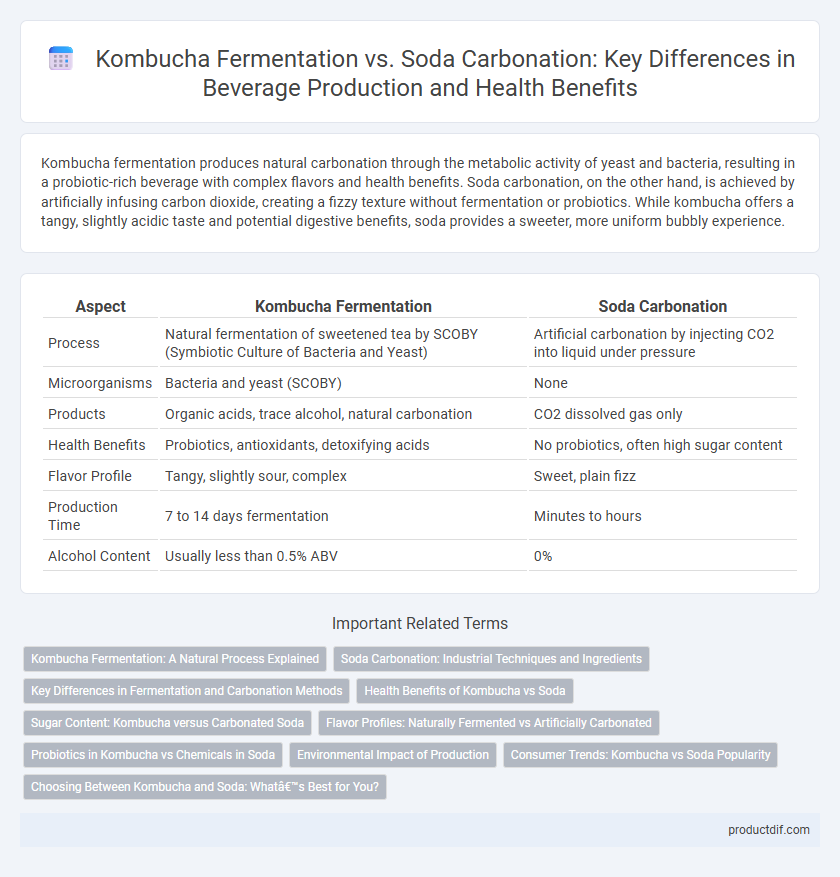Kombucha fermentation produces natural carbonation through the metabolic activity of yeast and bacteria, resulting in a probiotic-rich beverage with complex flavors and health benefits. Soda carbonation, on the other hand, is achieved by artificially infusing carbon dioxide, creating a fizzy texture without fermentation or probiotics. While kombucha offers a tangy, slightly acidic taste and potential digestive benefits, soda provides a sweeter, more uniform bubbly experience.
Table of Comparison
| Aspect | Kombucha Fermentation | Soda Carbonation |
|---|---|---|
| Process | Natural fermentation of sweetened tea by SCOBY (Symbiotic Culture of Bacteria and Yeast) | Artificial carbonation by injecting CO2 into liquid under pressure |
| Microorganisms | Bacteria and yeast (SCOBY) | None |
| Products | Organic acids, trace alcohol, natural carbonation | CO2 dissolved gas only |
| Health Benefits | Probiotics, antioxidants, detoxifying acids | No probiotics, often high sugar content |
| Flavor Profile | Tangy, slightly sour, complex | Sweet, plain fizz |
| Production Time | 7 to 14 days fermentation | Minutes to hours |
| Alcohol Content | Usually less than 0.5% ABV | 0% |
Kombucha Fermentation: A Natural Process Explained
Kombucha fermentation is a natural process where a symbiotic culture of bacteria and yeast (SCOBY) converts sweetened tea into a tangy, probiotic-rich beverage. This fermentation produces organic acids, B vitamins, and beneficial enzymes that support gut health, differentiating it from soda carbonation, which relies on artificial carbonation methods. The slow, biological fermentation in kombucha enhances flavor complexity and nutritional value without added sugars or preservatives common in soda production.
Soda Carbonation: Industrial Techniques and Ingredients
Soda carbonation relies on industrial techniques such as forced carbonation, where carbon dioxide gas is injected directly into the liquid under high pressure to achieve consistent fizz and enhanced shelf stability. Ingredients typically include carbonated water, sweeteners like high-fructose corn syrup or cane sugar, natural or artificial flavors, and preservatives such as sodium benzoate to maintain freshness. Advanced bottling systems ensure precise CO2 levels and minimize gas loss, crucial for mass production in the beverage industry.
Key Differences in Fermentation and Carbonation Methods
Kombucha fermentation involves a symbiotic culture of bacteria and yeast (SCOBY) that converts sweetened tea into a tangy, probiotic-rich beverage through natural fermentation, producing organic acids, enzymes, and beneficial microbes. In contrast, soda carbonation relies on artificial injection or natural fermentation with yeast and sugar to generate carbon dioxide, resulting in a fizzy, sweetened drink without live cultures. The key differences lie in kombucha's anaerobic fermentation producing live probiotics and complex flavors, versus soda's primarily aerobic carbonation focusing on carbonation and sweetness without fermentation-derived health benefits.
Health Benefits of Kombucha vs Soda
Kombucha fermentation produces probiotics and organic acids that support gut health and enhance digestion, unlike soda carbonation which relies on added sugars and artificial ingredients that can contribute to obesity and metabolic disorders. Kombucha contains antioxidants and B vitamins that boost immune function, whereas soda offers no nutritional benefits and may increase the risk of chronic diseases. Drinking kombucha regularly promotes a balanced microbiome and reduces inflammation, contrasting with the negative health impacts linked to excessive soda consumption.
Sugar Content: Kombucha versus Carbonated Soda
Kombucha fermentation transforms sugar into organic acids, resulting in lower residual sugar content compared to carbonated soda, which typically contains high levels of added sugars. While kombucha's sugar content varies depending on fermentation duration, it generally ranges from 2 to 6 grams per serving, significantly less than soda's average 25 to 40 grams per can. This makes kombucha a preferred beverage for those seeking reduced sugar intake without sacrificing flavor's effervescence.
Flavor Profiles: Naturally Fermented vs Artificially Carbonated
Kombucha fermentation produces complex flavor profiles characterized by tangy, slightly sour, and fruity notes resulting from the natural activity of bacteria and yeast. Soda carbonation relies on artificially injected carbon dioxide, creating sharp, fizzy sensations with consistently sweet or citrusy flavors derived from added sugars and artificial flavorings. The natural fermentation in kombucha introduces nuanced probiotics and organic acids, enhancing depth and health benefits absent in typical sodas.
Probiotics in Kombucha vs Chemicals in Soda
Kombucha fermentation produces a rich array of probiotics, including beneficial bacteria and yeasts that support gut health and enhance digestion. In contrast, soda carbonation relies on chemical additives like artificial sweeteners, phosphoric acid, and preservatives that can negatively impact metabolic function and gut microbiota. The natural probiotic content in kombucha offers functional health benefits absent in chemically carbonated sodas.
Environmental Impact of Production
Kombucha fermentation produces fewer greenhouse gas emissions compared to soda carbonation, which relies heavily on industrial CO2 injection. The natural fermentation process of kombucha utilizes organic ingredients and generates less waste, reducing its overall environmental footprint. In contrast, soda production requires significant energy input for carbonation and packaging, contributing to higher carbon emissions and resource depletion.
Consumer Trends: Kombucha vs Soda Popularity
Kombucha fermentation harnesses natural probiotics, appealing to health-conscious consumers seeking gut-friendly benefits, which has significantly boosted its market growth over recent years. Soda carbonation, primarily driven by sweetness and flavor variety, remains popular but faces declining demand due to rising awareness of sugar-related health risks. Consumer trends indicate a shift towards kombucha as a preferred beverage choice, with global sales projected to increase at a CAGR of over 20% compared to stagnant or declining soda consumption.
Choosing Between Kombucha and Soda: What’s Best for You?
Kombucha fermentation produces beneficial probiotics and organic acids that support gut health and improve digestion, while soda carbonation primarily adds fizzy bubbles without nutritional benefits. Choosing kombucha offers antioxidants and potential detoxifying effects, contrasting with soda's high sugar content and artificial additives linked to health risks. Prioritize kombucha for natural wellness advantages, or soda for occasional, sweet fizzy enjoyment with no probiotic value.
Kombucha fermentation vs Soda carbonation Infographic

 productdif.com
productdif.com